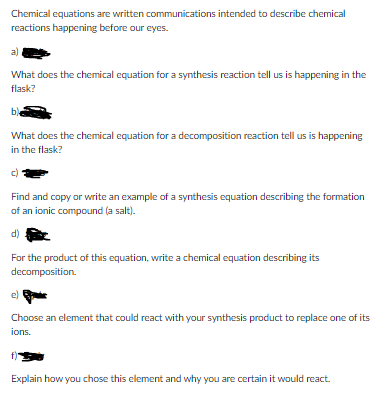Chemical equations are written communications intended to describe chemical reactions happening before our eyes. What does the chemical equation for a synthesis reaction tell us is happening in the flask? ble What does the chemical equation for a decomposition reaction tell us is happening in the flask? Find and copy or write an example of a synthesis equation describing the formation of an ionic compound (a salt). d) For the product of this equation, write a chemical equation describing its decomposition. c) Choose an element that could react with your synthesis product to replace one of its ions. Explain how you chose this element and why you are certain it would react.
Part C hint: come up with an example of a synthesis equation for an ionic compound.
Part D hint: write a chemical equation describing its decomposition. There’s a connection between parts c and d.
E hint: choose another element that could react with your synthesis product. For example, iron could react with magnesium oxide to do the replacement.


Since you have posted a question with multiple sub-parts, we will solve the first three subparts for you. To get the remaining sub-part solved please repost the complete question and mention the sub-parts to be solved.
A chemical reaction involves the reaction between two or more reactant molecules to form product(s). A reaction is classified into different categories depending on the reactants and products involved.
Trending now
This is a popular solution!
Step by step
Solved in 4 steps









